
- Home
- India
- World
- Premium
- THE FEDERAL SPECIAL
- Analysis
- States
- Perspective
- Videos
- Sports
- Education
- Entertainment
- Elections
- Features
- Health
- Business
- Series
- In memoriam: Sheikh Mujibur Rahman
- Bishnoi's Men
- NEET TANGLE
- Economy Series
- Earth Day
- Kashmir’s Frozen Turbulence
- India@75
- The legend of Ramjanmabhoomi
- Liberalisation@30
- How to tame a dragon
- Celebrating biodiversity
- Farm Matters
- 50 days of solitude
- Bringing Migrants Home
- Budget 2020
- Jharkhand Votes
- The Federal Investigates
- The Federal Impact
- Vanishing Sand
- Gandhi @ 150
- Andhra Today
- Field report
- Operation Gulmarg
- Pandemic @1 Mn in India
- The Federal Year-End
- The Zero Year
- Science
- Brand studio
- Newsletter
- Elections 2024
- Events
- Home
- IndiaIndia
- World
- Analysis
- StatesStates
- PerspectivePerspective
- VideosVideos
- Sports
- Education
- Entertainment
- ElectionsElections
- Features
- Health
- BusinessBusiness
- Premium
- Loading...
Premium - Events
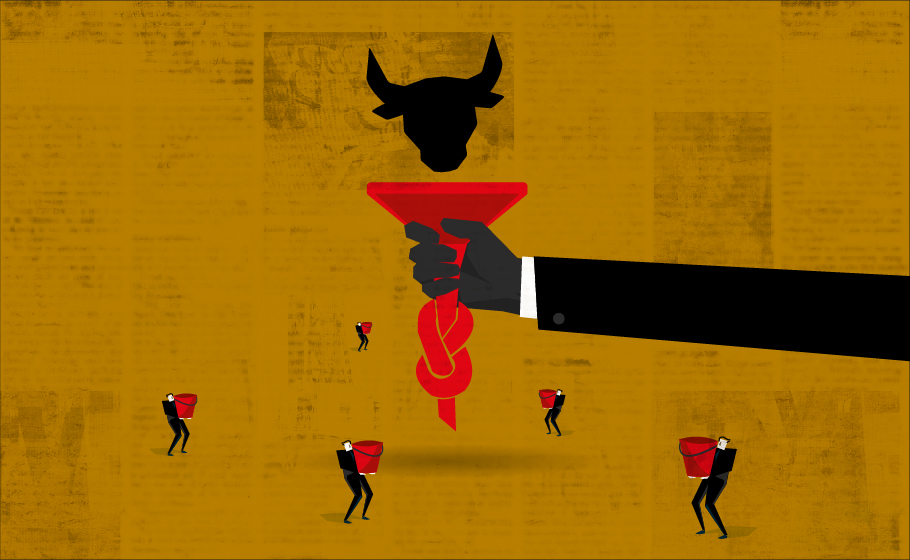
In the name of the cow, Karnataka’s ordinance slaughters civil liberties

Enacting the new anti-cow slaughter bill was never going to be easy for the BS Yediyurappa government in Karnataka. On December 9, 2020, the government quickly passed the bill in the Assembly, inviting severe backlash from opposition leaders. Congress leader Siddaramaiah slammed the government for passing the bill without discussion among legislators in the assembly. .@BSYBJP had told in...
Enacting the new anti-cow slaughter bill was never going to be easy for the BS Yediyurappa government in Karnataka. On December 9, 2020, the government quickly passed the bill in the Assembly, inviting severe backlash from opposition leaders.
Congress leader Siddaramaiah slammed the government for passing the bill without discussion among legislators in the assembly.
.@BSYBJP had told in the advisory committee that no new bill will be presented in the assembly. Anti-Cow slaughter bill was not there in today's agenda also.
But, all of a sudden, the bill was introduced and passed without any discussion. This is the murder of democracy.
2/5
— Siddaramaiah (@siddaramaiah) December 9, 2020
Only a coward govt, which can't debate, can behave like this. They can't stop us through their autocratic behaviour. We will take this to the people to fight against @BJP4Karnataka's corruption & despotism.
3/5
— Siddaramaiah (@siddaramaiah) December 9, 2020
Calling it “a coward government”, Siddaramaiah, who has openly declared himself as a beef eater, said the law would not only infringe upon his personal right to food, but also gravely impact farmers in the state.
Pretty soon, the bill ran into hurdles in the upper house of the state, the Legislative Council. In no mood to stop, the BJP on January 5, 2021, promulgated the bill as an ordinance, Karnataka Prevention of Slaughter and Preservation of Cattle Ordinance.
Provisions of new law
Unlike the 1964 anti-cow slaughter law, which banned slaughter of cows up to 12 years of age, the Karnataka Prevention of Slaughter and Preservation of Cattle Ordinance, 2020, bans the slaughter of cows, bulls, and bullocks of all ages and buffaloes aged less than 13 years.
The new law has stricter provisions regarding transportation of cattle, imposing penalties and allows provisions for search and seizure at slaughterhouses.
It discourages transportation within the state or outside for slaughter without permission from a competent authority and paying a prescribed fee.
Even for agricultural purposes, a competent authority will have to issue permits for transporting the cattle.
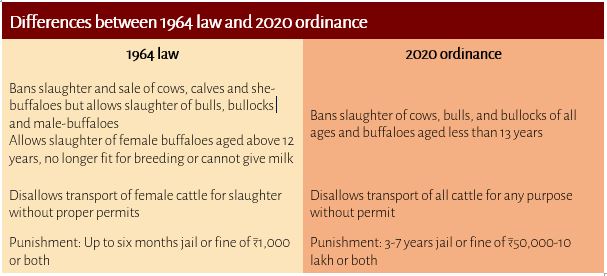
It envisages the establishment of ‘Gaushalas’ (cow shelters) for the protection and preservation of cattle.
The new law empowers police officials as low as a sub-inspector (SI) to inspect and seize cattle or premises and materials used. He may detain suspects and arrest people on suspicion.
The slaughter of cattle will lead to imprisonment of up to 3-7 years and a fine ranging from ₹50,000-5 lakh for a first time offender. A repeat offender can be jailed up to seven years and face a fine from ₹1 lakh to ₹10 lakh.
To top it all, in a shocking move, the law provides protection to cow vigilantes (gau rakshaks) and government officials acting against suspects. The law says no suit, prosecution, or other legal proceedings shall be instituted against competent authority or any person exercising powers under the Act for anything which is done/intended to be done in “good faith”.
Going further, the ruling regime even asked officials (agriculture department, dairy, and agriculture university professors) to not talk about the cons of the new law.
The milk-cooperative society officials said the government had instructed them not to talk about the cons of the law in public forums. They fear it would result in a farmers’ uprising.
The new law is detrimental to all stakeholders—farmers, veterinarians, tanners, meat traders and exporters, and consumers while empowering animal officials, police and vigilante groups.
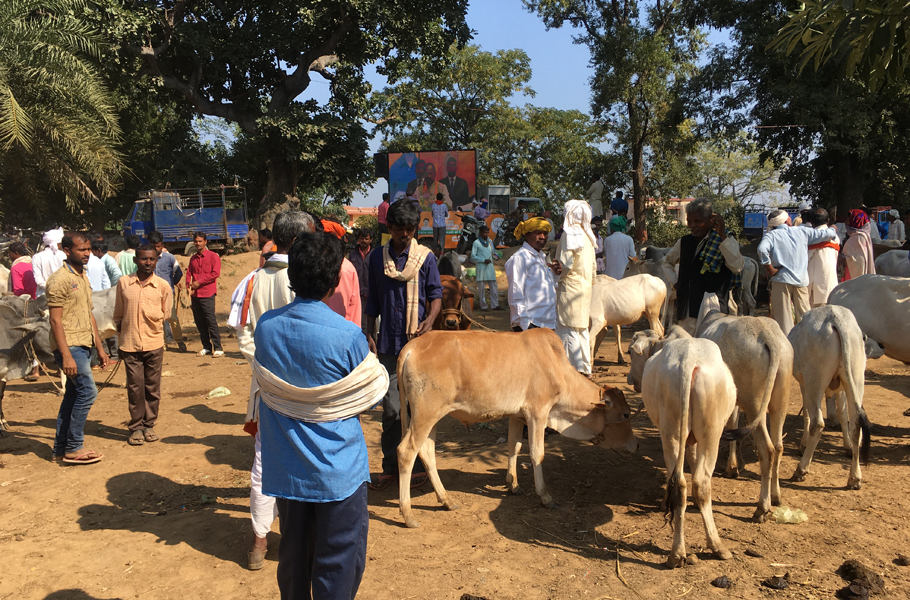
Farmers’ woes
Usually, farmers sell the male animals when they are 3-4 years’ old since they do not provide milk nor can they be used in the fields for farming—as tractors have replaced cattle for ploughing. Nor do much of the farmers rear it for sport events like Jallikattu or cart races. The quintessential bullock cart that used to be the primary mode of transport too has become extinct.
Hence, the farmer sells it to the food, leather, or cosmetic industry and earns about ₹30,000 per animal.
But if they are not allowed to sell to these, most small farmers have to incur expenses that become a burden on them. With low resources, many have to depend on government-run animal shelters for water and feed during summer.
For instance, Anil N, a 26-year-old second-generation farmer in Gandhinagar in Kolar district had nine cows that fetch him 100 litres of milk a day, earning a profit of ₹1,200 a day. Today, he has four calves (two male and two female), four cows, and four others which are undergoing artificial insemination.
“After the male calf turns 2.5-3 years, we have to spend ₹150 per day per animal to take care of it (water, feed, and maintenance). So for a male species that yields nothing except cow dung, why would we spend ₹4,500 a month?” Anil asks.
For a female animal, if he spends the same money, he gets a return of ₹300 from its milk.
Keeping a male species is economically not viable for the farmer and it also causes disturbance to the female one as they age.
But with the new law, Anil will have to spend ₹4,500 a month on the bulls for the next 10 years. Instead, if he sells it at the age of three years as he used to before, he would get ₹30,000 from the slaughterers or beef traders. But the new law bars him from doing that.
The government says cattle can never be rendered useless as they see it as a moving manure factory with cow dung produced every day. But farmers say they can possibly get two tractor loads of cow dung from one animal, that may fetch him ₹4,000 per year only, all after spending ₹54,000 annually. So it’s not a profitable option for the farmer to keep the cattle.
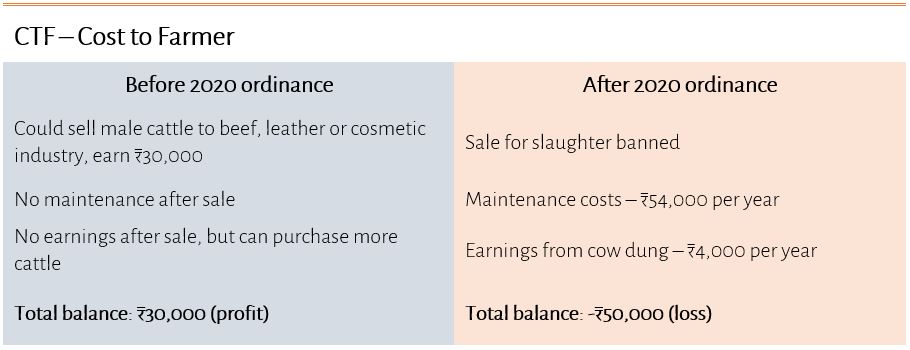
“If I give it to the government shelter, I get nothing in return. And there are not much facilities in the existing government shelters as we can see how poorly they take care of them during summers,” Anil said.
Besides, the farmer will have to be wary of cow vigilantes and police every time he transports the animal and be at the mercy of veterinarians who would certify the cattle’s age and whether it’s ready to sell.
“Neither can we sell and make money nor can we let them on the streets as it would cause a nuisance to the locals and may increase road accidents. So we are in a fix,” Anil says perplexedly.
Farmers also do not keep the male cows for mating as most farmers now depend on artificial insemination. In Karnataka alone, 35.29 lakh artificial inseminations were done in 2018-19.
Leather, meat industry in trouble
The new law also takes away lakhs of jobs in the leather and meat industry.
The number of small industries involved in tanning and dressing of leather, manufacture of luggage, handbags, saddlery, harness and footwear had gone up from 60 in 2014-15 to 167 by November 2018, according to the Economic Survey of Karnataka. It, however, dropped to 142 in the subsequent year.
Also, leather exports increased by 58% between 2016 and 2018. It increased from ₹355 crore in 2016-17 to ₹562 crore by FY 2018-19.
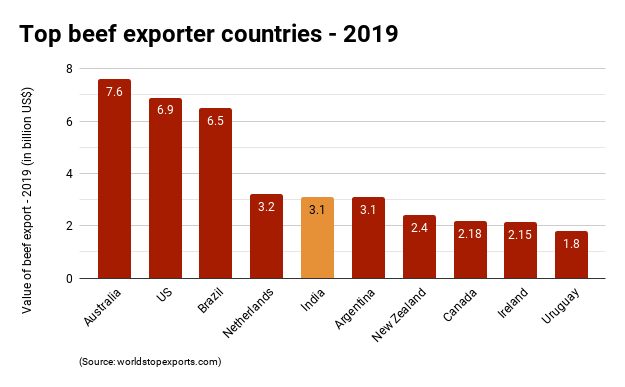
An officer at Dr Babu Jagajeevan Ram Leather Industries Development Corporation said at least 50,000-60,000 people involved in tanning and leather production will be affected. The raw materials are sent to Ranipet in Tamil Nadu for processing.
If one looks at the meat industry, Uttar Pradesh, Andhra Pradesh, Maharashtra, and Punjab are the major producers of buffalo meat. India exported 11,52,547.32 metric tonnes of buffalo meat products worth ₹22,668.48 crores in 2019-20. India is one of the leading exporters of buffalo meat.
Karnataka’s meat industry had gotten a boost after Maharashtra imposed a similar cow slaughter ban (in 2015, five years before Karnataka did), as Goa, known for being an international tourist hub, came to Karnataka for buffalo meat. The state saw an increase in beef production from districts like Belagavi, Vijayapura, Raichur, Haveri, and Koppal in North Karnataka.
Now, butchers across the state are a worried lot as they fear a rise in vigilantism and harassment by the police.
On January 13, eight days after the ordinance was promulgated, a canter owner-driver was beaten up badly and robbed by cow vigilantes in Sringeri town for transporting cattle allegedly for slaughter. Abid Ali, the victim, said he was transporting 12-15 cattle heads from Ranebennur to Mangaluru “for agriculture purposes” and had all documents and permits.
The police, despite registering a case on his complaint, also filed a case against Ali for transporting cattle with no safety measures under the new Ordinance.
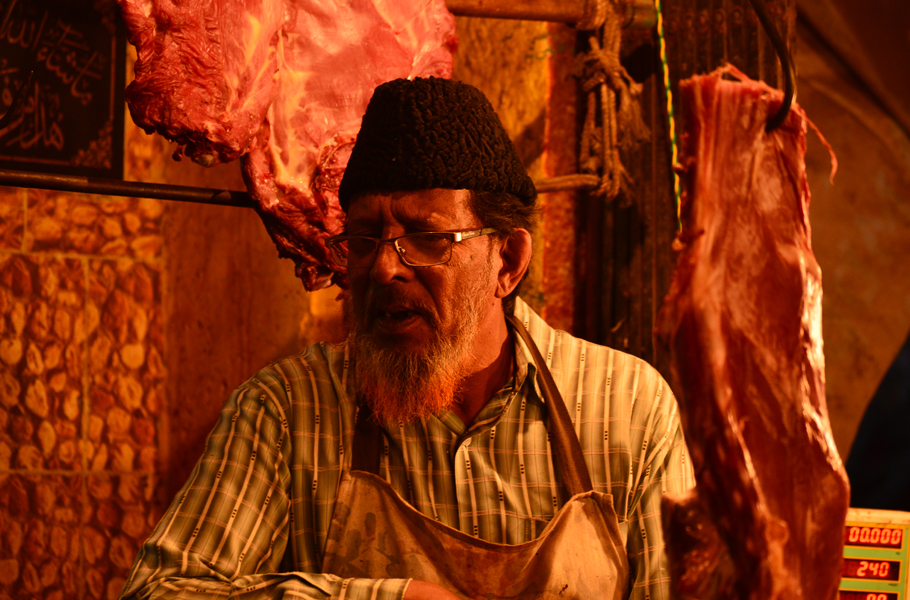
In Bangalore’s two biggest beef markets, Russel Market and Johnson Market, beef merchants say close to a lakh families are involved in tanning and meat trade and they would be affected. They supply meat to restaurants, hotels, and directly to thousands of customers across the city.
Shafiullah Qureshi, secretary of beef merchants’ association in Bangalore, says in Karnataka alone, a lakh people will lose their jobs and their families will all be affected. It includes skin merchants, tallow merchants, bone factory workers, beef sellers, and transporters.
“We did make an appeal to secular parties to stop the government from passing one such bill. But the government succeeded by bringing in an ordinance. We will challenge it in the court,” Qureshi added.
“No one slaughtered a cow for the last five decades (since 1964). What was the need for the government to include buffaloes and bulls into the Act? More than Muslims in the meat trade, it’s the farming community that’ll largely be affected,” says Khasim Qureshi, a meat merchant in Bangalore who’s in the business for 38 years.
“The government seems to target one particular community. But it’s not just Muslims, even Dalits and other religious minorities, including Brahmins, are involved in the leather trade,” says a retired professor of Institute of Socio-Economic Change (ISEC), Bangalore, who wishes to remain anonymous. “This is atrocious and the repercussion will be there for years to come.”
He says not only does the Act ban cattle slaughter based on majoritarian view and reverence for the cow, it also slaughters the civil liberties of people, affecting their food choices, for some of whom it’s a cheap source of protein.
While Karnataka Chief Minister BS Yediyurappa told the media that 90 per cent people were happy with the anti-cow slaughter bill and his government was committed to protect abandoned cows, his predecessor HD Kumaraswamy of JD(S) said the legislation does not protect farmers who actually protect and nurture cattle.
“The law would increase the financial burden on dairy farmers and make dairy farming a loss-making venture.”
By opposing #CowSlaughterBan, communal @INCKarnataka is proving that "Appeasement Politics" is more important to it than sentiments of Hindus.
Should one's parents be sent to retirement homes after they become old?
Is this what @siddaramaiah & @DKShivakumar propose?#GauMata
— BJP Karnataka (@BJP4Karnataka) December 10, 2020
But the government seems to be in no mood to pay heed to his voice.
When asked what other options lay before him, farmer Anil says he will offer the cattle to those who go door-to-door begging for food and money in the name of “cow”.
